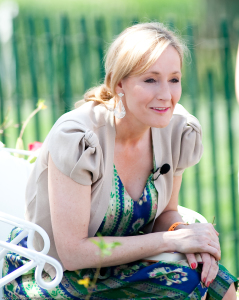Reading Rowling in the Context of Christianity
 “‘Hogwarts School of Prayer and Miracles?’ Harry queried. . . ’I want to go there!’ Hagrid beamed widely. He had been praying so hard to save a soul today; and he was so happy to have saved the soul of such a sweet, earnest little one. The poor boy, being raised by two parents who were not Christian…It was a good thing Hagrid had got here in time. Five years down the road, Harry might have been a fornicating, drug-addicted Evolutionist!”
“‘Hogwarts School of Prayer and Miracles?’ Harry queried. . . ’I want to go there!’ Hagrid beamed widely. He had been praying so hard to save a soul today; and he was so happy to have saved the soul of such a sweet, earnest little one. The poor boy, being raised by two parents who were not Christian…It was a good thing Hagrid had got here in time. Five years down the road, Harry might have been a fornicating, drug-addicted Evolutionist!”
This excerpt is taken from the Harry Potter fan fiction Hogwarts School of Prayer and Miracles, written by username Proudhousewife. Her motivation behind writing is so her “little ones” can read Harry Potter without “turning into witches”.
While the legitimacy of Hogwarts School of Prayers and Miracles is debatable (gag reflexes worldwide hope it’s satire) it remains that the fan fiction speaks to enduring controversy surrounding the J. K. Rowling Harry Potter series. It is a fairly common opinion that Christianity and Harry Potter are in direct opposition with one another, with proponents of this belief usually citing Revelation 21:8 or Zechariah 10:2. Many parents prevent their children from reading the books, either because they believe them to be promoting Satan or because they are simply unwilling to take that chance. This is unfortunate, as once one actually reads the series it becomes difficult to hold fast to belief in its anti-Jesus agenda.
In fact, Harry Potter can be read as an allegory for Jesus’s resurrection. While obviously the plot isn’t an exact parallel, Christian themes pervade throughout: the ultimate triumph of love over hate, speaking out for the oppressed, standing beside and supporting the weak. Voldemort, the Dark Lord notorious for his explicit and unapologetic evil, possesses a “gift for spreading discord and enmity”, and stands as an allegorical representation of Satan. Like the fallen angel Lucifer, he too was once beautiful; his pride in attempting to create his own immortality is his downfall.
 Harry himself is an imperfect character allegory for Jesus; unlike Jesus, Harry is flawed. Yet there are unmistakable parallels to be found between the two: Jesus ignores the value the world places on social standing and wealth; he breaks bread with prostitutes, tax collectors, and sinners. Harry similarly refuses to acknowledge the hierarchical barriers the wizarding world places on the purity of one’s “blood”, and instead operates outside them. Harry’s loved ones do not fit into conventional pureblood wizard society. His closest friends include “muggle-born” Hermione; Ron, who comes from an embarrassingly poor family (who in addition are “muggle” sympathizers); Hagrid, a “half-breed”, half-giant, half-man; Dobby, a house-elf; and his godfather Sirius Black who is demonized by the wizarding world at large as a criminal.
Harry himself is an imperfect character allegory for Jesus; unlike Jesus, Harry is flawed. Yet there are unmistakable parallels to be found between the two: Jesus ignores the value the world places on social standing and wealth; he breaks bread with prostitutes, tax collectors, and sinners. Harry similarly refuses to acknowledge the hierarchical barriers the wizarding world places on the purity of one’s “blood”, and instead operates outside them. Harry’s loved ones do not fit into conventional pureblood wizard society. His closest friends include “muggle-born” Hermione; Ron, who comes from an embarrassingly poor family (who in addition are “muggle” sympathizers); Hagrid, a “half-breed”, half-giant, half-man; Dobby, a house-elf; and his godfather Sirius Black who is demonized by the wizarding world at large as a criminal.
Jesus’s choice to eat with sinners is controversial due to the world’s respect for him as a rabbi and prophet, someone holy. Harry is usually widely admired and respected throughout the wizarding world (though this favor varies), and therefore “people expect [him] to have cooler friends than us,” says Luna Lovegood, a character avoided for being especially eccentric. Jesus transcends the world’s understanding of worth; Harry ignores the wizarding world’s social hierarchy.
Harry’s most striking parallel to Jesus is apparent in the last book, The Deathly Hallows. Harry willingly gives up his life to save the entire world from Voldemort. Without Harry’s death, Voldemort’s defeat would not be possible. Just as the lion Aslan allows himself to be sacrificed on the Stone Table in The Chronicles of Narnia, Harry meets Voldemort and death in the Forbidden Forest, sacrificing himself for those he loves.
Jesus died for our sins in an undeserved act of unfathomable love, conquered sin and death and rose again. Harry dies so Voldemort can ultimately be defeated, protecting the wizarding world. He then rises from the dead and participates in the battle, where Voldemort is killed when his own killing curse backfires.
Clearly, the Harry Potter books are not intended as perfect allegories to the resurrection story. However, it cannot be denied that the stories contain Christian truth. Douglas Jones, editor of evangelical magazine Credenda/Agenda writes, “the Potter stories give us largely Christianized witches, witches who have fully absorbed Christian ethical categories: love, kindness, hope, loyalty, hierarchy, community.” J.K. Rowling even admits that Christianity was one of her “major inspirations” while writing. In this way, Harry Potter can be read through a Christian context: to be attentive to God’s truth embedded in the art around us (even Harry Potter) is an effort towards wholeness, comprehending faith from a variety of angles.
